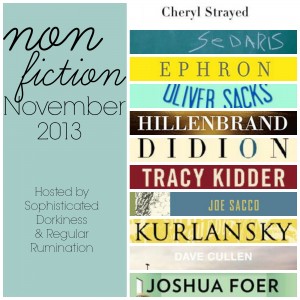 I’m so excited about the wonderful reception there has been to Nonfiction November, a month-long celebration of nonfiction I’m co-hosting with Leslie of Regular Rumination! Throughout the month, we’ll be reading and writing about nonfiction, and encouraging other readers to join us through a series of post topics.
I’m so excited about the wonderful reception there has been to Nonfiction November, a month-long celebration of nonfiction I’m co-hosting with Leslie of Regular Rumination! Throughout the month, we’ll be reading and writing about nonfiction, and encouraging other readers to join us through a series of post topics.
Last week we had a bunch of different people join in to share some of their favorite nonfiction books. You can check out a wrap-up for the week over at Leslie’s blog. This week we wanted to give a variety of options to write, but all focused around sharing several nonfiction books on a single topic:
Be the Expert/Ask the Expert/Become the Expert: Share a list of nonfiction books on a topic you know a lot about. Or, ask for some advice for books on a particular topic. Or, put together a list of nonfiction books on a topic you’re curious about.
One of the topics that I’ve been obsessed with this year is personal productivity and time and attention management. I’m a pretty productive person, but I’ve found that if I’m not careful I lose track of things that need to get done as well as the time I need to do them. I’ve read several books this year on these topic, and purchased even more that I haven’t made time to read yet that I wanted to share with you.
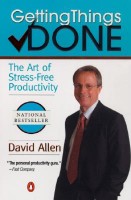 Getting Things Done: The Art of Stress-Free Productivity by David Allen — This is probably the Bible of the personal productivity movement. In the book, Allen outlines five-stages of workflow and a system designed to address those steps. I read this book near the beginning of the year and implemented parts of Allen’s process, but have since slacked off since only implementing parts of the system doesn’t really allow you to do GTD well. But the basic principles of the method make a lot of sense to me — write things down, put them in the place that makes sense, review your lists, find ways to give yourself reminders in context and keep strong walls around your systems. I’m hoping to revisit this book sometime before the end of the year so I can really do GTD well.
Getting Things Done: The Art of Stress-Free Productivity by David Allen — This is probably the Bible of the personal productivity movement. In the book, Allen outlines five-stages of workflow and a system designed to address those steps. I read this book near the beginning of the year and implemented parts of Allen’s process, but have since slacked off since only implementing parts of the system doesn’t really allow you to do GTD well. But the basic principles of the method make a lot of sense to me — write things down, put them in the place that makes sense, review your lists, find ways to give yourself reminders in context and keep strong walls around your systems. I’m hoping to revisit this book sometime before the end of the year so I can really do GTD well.
For More: David Allen has made a big business out of productivity. A couple of his other books that I want to pick up are Making It All Work and Ready for Anything.
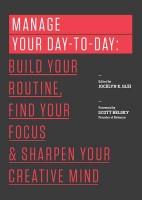 Manage Your Day-to-Day: Build Your Routine, Find Your Focus and Sharpen Your Creative Mind, edited by Jocelyn K. Glei — This book is a collection of short essays by “leading creative minds” about how to create time during a hectic work environment to do strong creative work. The essays are divided into four sections: building a rock-solid routine, finding focus in a distracted world, taming your tools, and sharpening your creative mind. If you’ve read a lot on time and productivity, then many of these essays won’t cover new ground, but a lot of it was new and helpful to me. It was nice to see about how real people have developed strategies for making time for important work.
Manage Your Day-to-Day: Build Your Routine, Find Your Focus and Sharpen Your Creative Mind, edited by Jocelyn K. Glei — This book is a collection of short essays by “leading creative minds” about how to create time during a hectic work environment to do strong creative work. The essays are divided into four sections: building a rock-solid routine, finding focus in a distracted world, taming your tools, and sharpening your creative mind. If you’ve read a lot on time and productivity, then many of these essays won’t cover new ground, but a lot of it was new and helpful to me. It was nice to see about how real people have developed strategies for making time for important work.
For More: The organization that put together Manage Your Day-to-Day came out with a second book last month, Maximize Your Potential: Grow Your Expertise, Take Bold Risks and Build and Incredible Career. I bought this one right away, but I haven’t started reading it yet.
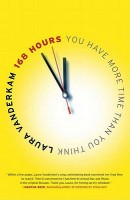 168 Hours: You Have More Time Than You Think by Laura Vanderkam — Last year, I read Laura Vanderkam’s most recent book, All the Money in the World. When I started on this productivity kick, I immediately thought to buy her first book, 168 Hours. In the book, Vanderkam takes on the myth that we don’t have enough time to do what we want by talking with people who have managed to find time to do incredible things. I’ve skimmed some sections of this, but haven’t made the time to read the whole thing. But I’m excited to check it out and see what advice Vanderkam can offer.
168 Hours: You Have More Time Than You Think by Laura Vanderkam — Last year, I read Laura Vanderkam’s most recent book, All the Money in the World. When I started on this productivity kick, I immediately thought to buy her first book, 168 Hours. In the book, Vanderkam takes on the myth that we don’t have enough time to do what we want by talking with people who have managed to find time to do incredible things. I’ve skimmed some sections of this, but haven’t made the time to read the whole thing. But I’m excited to check it out and see what advice Vanderkam can offer.
For More: Earlier this year, Vanderkam published a paperback that collects three ebook shorts she wrote after 168 Hours, What The Most Successful People Do Before Breakfast. The book looks at strategies for maximizing mornings, weekends and work. I’ve read the section on weekends, which gave me many good ideas about planning to make weekends more invigorating. I’m looking forward to the rest.
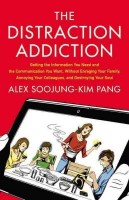 The Distraction Addiction by Alex Soojung-Kim Pang — I’m not going to say a ton about this book today, since I’m hoping to have a full review up on Wednesday. In brief, Pang looks at ways we can remain connected to ourselves without sacrificing intelligence, attention spans or quality of life. The book was a perfect mix of philosophical and practical advice that resonated strongly with me.
The Distraction Addiction by Alex Soojung-Kim Pang — I’m not going to say a ton about this book today, since I’m hoping to have a full review up on Wednesday. In brief, Pang looks at ways we can remain connected to ourselves without sacrificing intelligence, attention spans or quality of life. The book was a perfect mix of philosophical and practical advice that resonated strongly with me.
For More: Fellow book lover Rebecca Schinsky has been raving about Clive Thompson’s Smarter Than You Think, which looks to be a book in the same vein. I bought it on impulse and really hope to get to it this month.
I’m not sure if all the time invested in reading about productivity has actually made me more productive. I think I know what the strategies for productivity and focus are, I just continue to struggle to implement them myself. But I want to do better, and think that these books are helping me to slowly get there.
Before we get to the Mr. Linky, a couple of quick programming notes:
- I’ll be doing the wrap up, so check back here sometime on Friday to see a summary of what everyone has been writing about.
- If you post any reviews of nonfiction books this week, include them in the Mr. Linky. I’ll add those to the wrap-up as well.
- If you’re talking about Nonfiction November on Twitter, please use the hashtag #nonficnov for your posts so we can find them. Happy reading!
Mister Linky’s Magical Widgets
This plugin requires intervention by this site’s administrator.
To display the widget for this post, please click here.

Comments on this entry are closed.
What a great idea! I’m eager to stop back later in the week to check out the lists from other nonfiction lovers! My link is actually to a Tuesday Ten post I did back in September about my favorite nonfiction “books about books”–because, if you’re a booklover, what could be better than reading about books and reading?!?!
I’m also in the middle of a new Tuesday Ten about a different nonfiction topic–I’ll stop back and post that one as well (I hope it’s OK to double-dip!)
Thanks for hosting such a wonderful linkup!
Yes, post as many times as you feel like it — the more the merrier 🙂
I’m talking about the Romanovs today… http://julzreads.wordpress.com/2013/11/11/nonfiction-november-expert-advice-the-romanovs/
I LOVE the Romanovs! Great topic!
Love this idea! I’m talking about memoirs of the French lifestyle 🙂
I’ve been a big fan of GTD for a long time, although most of the time I only have it partially implemented. My In Box and Tickler are vital to me but I go back and forth about how to keep my action lists. Lately, I’ve gravitated back to context lists, but I use it mostly to make my daily to do list which I can never seem to get away from and finally have decided to embrace.
I liked 168 Hours but what has stayed with me the longest is what I learned from keeping a time log for 3 weeks. It was a couple of years ago and the experience still gets me to be more conscious of my time use.
I just put Smarter Than You Think and The Distraction Addiction on hold at the library.
I have a tickler file at work that is working really well for me. I haven’t figured out how to make that work for my home life, but I’m thinking about it. I need to work on action lists too… I’m good at making lists, just not figuring out when to review them and deciding what things I can actually do in a given time.
Looking forward to what everyone comes up with!
I bought a copy of Getting Things Done on the strong recommendation of the Books on the Nightstand folks, I think, but haven’t even cracked it open, and it’s been months! Maybe I’ll get to it in the New Year, along with all the other books I’ve been saying that about. I probably won’t have time to pull any Nonfiction November posts together, myself, because I’m so behind, but just wanted to say it’s a great idea and I’m enjoying reading what everyone else is posting!
Thank you! I’m having such fun reading all of the other posts… my TBR list is growing so quickly!
I’m veering from the assignment a little, I have two non-fiction posts scheduled for this week, on things that I happen to know a fair amount about, today is U.S. Presidents (John Adams) and Friday will be a post on feminism!
I know it’s not a list, but seriously the whole NaNoWriMo thing is seriously cutting into my reading and blogging time!
What a great topic! I love self-help books that give actionable advice, including books on productivity. I enjoyed All the Money in the World too, so hopefully I’ll get to 168 Hours sometime soon 🙂
What I loved about All the Money in the World is that she wasn’t afraid to take on a bunch of money habits that we just take for granted, and veered away from simplistic advice like “stop buying a morning latte.” I’m hoping 168 Hours does the same kind of big picture thinking.
I could definitely use a few of your time management books, I haven’t read any! Can’t wait to see your review of The Distraction Addiction, because I know I could use some serious help with that 🙂
I’m always trying to be more productive with my time, so I’m going to see if my library has 168 Hours. Great-looking list!
I definitely have to recommend some of these to my students! Time management and reducing distractions are such important skills in college.
I wrote a post for this week, my “expertise” is wine: http://nonfictionado.com/index.php/nonfiction-november-week-2-become-expert-books-about-wine/
It’s one thing to read about it, another thing entirely to start to take concrete action to make changes — it’s difficult!
Nice list! I always think of myself as being anti- self-help books, but I’m a sucker for books like these, so maybe not. 🙂
I don’t tend to like self-help either, but I think these work because the focus isn’t necessarily on making changes, it’s on providing information and ideas that you have to think about implementing for yourself.
I’m enjoying this feature a lot – so many good recommendations! Thanks for hosting this.
I like reading books on time management too, Kim! But I have the same problem in that I don’t feel like I get better at managing my time – I think I just like reading about how to reduce procrastination because it’s, in essence, a form of procrastination itself… 168 Hours and What The Most Successful People Do Before Breakfast sound interesting, and I look forward to reading them!
I also wonder if reading books on these topics is a form of procrastinating. I guess it depends if you try to implement any changes or just keep looking for new, better ways to waste time 🙂
I’m all over this! I think that this is such an easy one for everyone to relate to: we all need more time in our days!